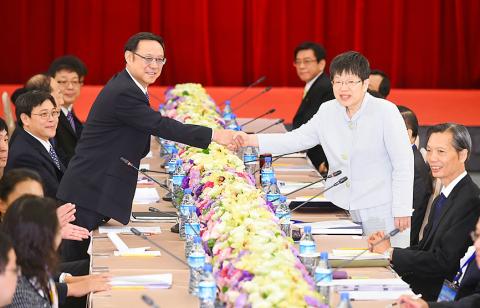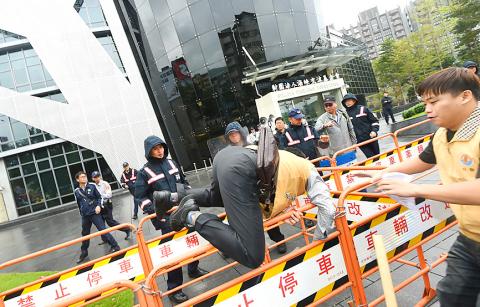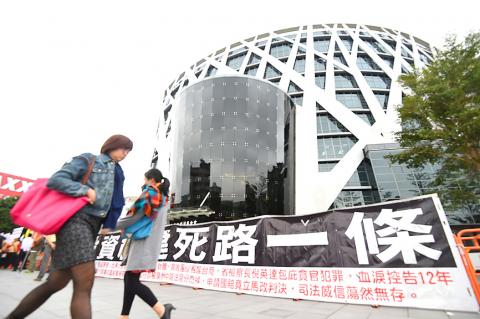China’s Association for Relations Across the Taiwan Straits (ARATS) Chairman Chen Deming (陳德銘) yesterday arrived in Taiwan for a seven-day visit.
Chen headed to the Taichung-based Tachia Chenlan Temple on arrival, which is dedicated to Matsu, goddess of the sea, a Straits Exchange Foundation (SEF) official said.
Chen is to visit Taipei, New Taipei City, Keelung, Yilan, Hsinchu, Miaoli and Nantou.

Photo: Chang Chia-ming, Taipei Times
The main purpose of the trip is to engage with Taiwanese in grassroots communities and promote cross-strait cultural, economic and trade policies, the official said.
Separately yesterday, a meeting was held with SEF Vice Chairman Shih Hui-fen (施惠芬) and ARATS Deputy Chairman Zheng Lizhong (鄭立中) to review the results of agreements signed by the two organizations.
At a press briefing in Taipei, Zheng denied that only large companies benefit from the pacts.

Photo: Chang Chia-ming, Taipei Times
“No trade or economic activities can create equal benefits for all people, but the overall economy can see spill-over effects, such as job creation and tax revenue growth,” he said.
When asked about actions taken by ARATS after the Chinese Communist Party’s Central Commission for Discipline Inspection, on Oct. 22 published a report on 15 government agencies and state-owned enterprises including the Taiwan Affairs Office (TAO), Zheng said that there was illegal solicitation of funding among organizations tasked with handling cross-strait affairs.
“Problems such as soliciting sponsorship do exist,” Zheng said.

Photo: Chang Chia-ming, Taipei Times
The report said the TAO is soft on officials that are found to have violated regulations and has poor supervision of organizations under its umbrella.

DEFENSE: The National Security Bureau promised to expand communication and intelligence cooperation with global partners and enhance its strategic analytical skills China has not only increased military exercises and “gray zone” tactics against Taiwan this year, but also continues to recruit military personnel for espionage, the National Security Bureau (NSB) said yesterday in a report to the Legislative Yuan. The bureau submitted the report ahead of NSB Director-General Tsai Ming-yen’s (蔡明彥) appearance before the Foreign and National Defense Committee today. Last year, the Chinese People’s Liberation Army (PLA) conducted “Joint Sword-2024A and B” military exercises targeting Taiwan and carried out 40 combat readiness patrols, the bureau said. In addition, Chinese military aircraft entered Taiwan’s airspace 3,070 times last year, up about

A magnitude 4.3 earthquake struck eastern Taiwan's Hualien County at 8:31am today, according to the Central Weather Administration (CWA). The epicenter of the temblor was located in Hualien County, about 70.3 kilometers south southwest of Hualien County Hall, at a depth of 23.2km, according to the administration. There were no immediate reports of damage resulting from the quake. The earthquake's intensity, which gauges the actual effect of a temblor, was highest in Taitung County, where it measured 3 on Taiwan's 7-tier intensity scale. The quake also measured an intensity of 2 in Hualien and Nantou counties, the CWA said.

Taiwan is stepping up plans to create self-sufficient supply chains for combat drones and increase foreign orders from the US to counter China’s numerical superiority, a defense official said on Saturday. Commenting on condition of anonymity, the official said the nation’s armed forces are in agreement with US Admiral Samuel Paparo’s assessment that Taiwan’s military must be prepared to turn the nation’s waters into a “hellscape” for the Chinese People’s Liberation Army (PLA). Paparo, the commander of the US Indo-Pacific Command, reiterated the concept during a Congressional hearing in Washington on Wednesday. He first coined the term in a security conference last

The Overseas Community Affairs Council (OCAC) yesterday announced a fundraising campaign to support survivors of the magnitude 7.7 earthquake that struck Myanmar on March 28, with two prayer events scheduled in Taipei and Taichung later this week. “While initial rescue operations have concluded [in Myanmar], many survivors are now facing increasingly difficult living conditions,” OCAC Minister Hsu Chia-ching (徐佳青) told a news conference in Taipei. The fundraising campaign, which runs through May 31, is focused on supporting the reconstruction of damaged overseas compatriot schools, assisting students from Myanmar in Taiwan, and providing essential items, such as drinking water, food and medical supplies,